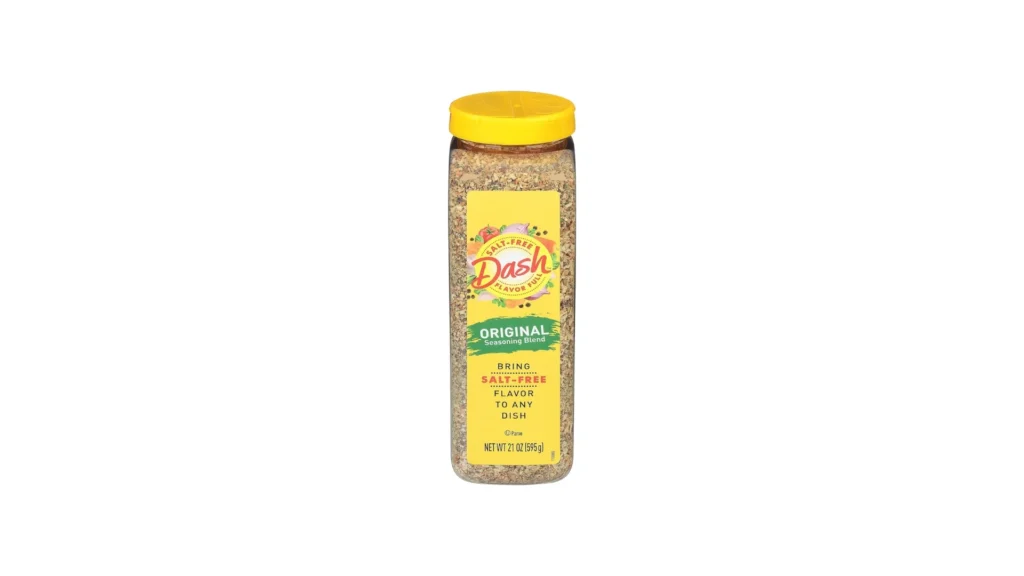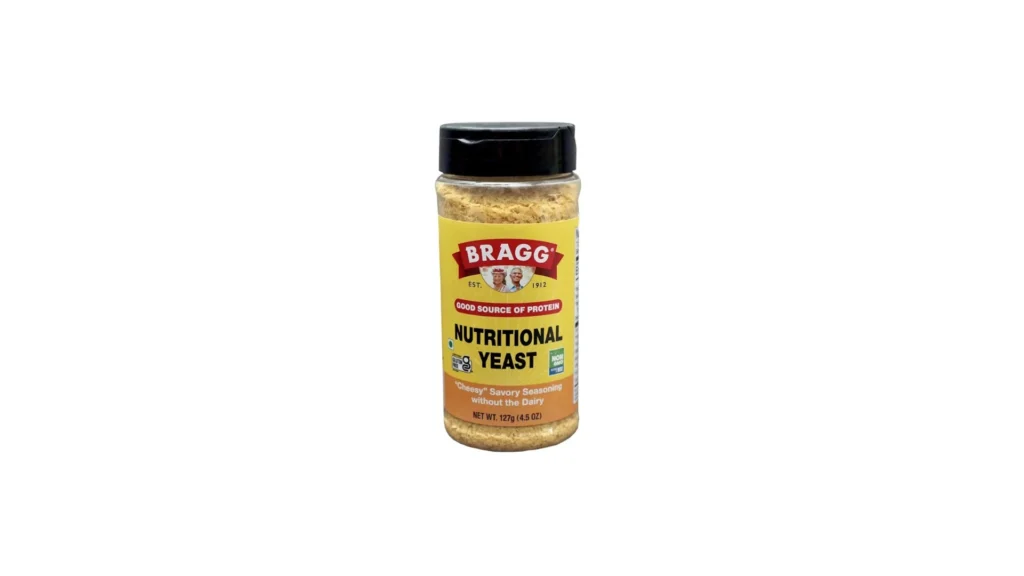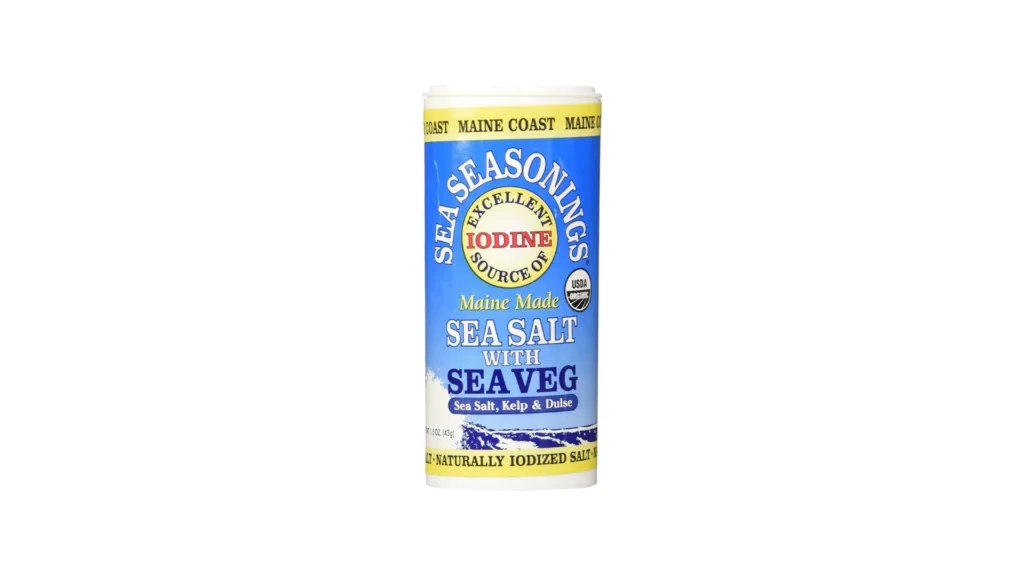Are you looking to shake up your seasoning game without the health risks of too much sodium? You’re in the right place! We’re about to dive into the world of salt substitutes, exploring the best salt substitute options that can add flavour to your meals without the worry.
Let’s face it, we all love a bit of saltiness in our food. But with high blood pressure and heart disease on the rise, many of us are searching for healthier alternatives. That’s where salt alternatives and low-sodium seasonings come in.
In this guide, we’ll explore everything from potassium-based substitutes to herb blends and natural umami boosters. We’ll look at how these options stack up in taste, health benefits and ease of use. Whether you’re a health-conscious cook or just curious about reducing sodium intake, we’ve got you covered.
So, ready to spice up your life (minus the salt)? Let’s dive in and discover the perfect salt substitute for your kitchen!
📌 Key Takeaways:
| Product Name | Type | Key Ingredients | Best For | Unique Feature |
|---|---|---|---|---|
| NoSalt Original | Potassium-based | Potassium chloride | Closest salt taste | High in potassium |
| Mrs. Dash Original Blend | Herb and spice blend | Onion, garlic, herbs | Versatile seasoning | No artificial flavours |
| Bragg Nutritional Yeast | Umami-rich | Nutritional yeast | Adding savory flavor | Good source of B-vitamins |
| Maine Coast Sea Vegetables Dulse Granules | Natural mineral-rich | Dried seaweed | Mineral boost | Unique sea flavor |
| Benson’s Table Tasty | Salt-free seasoning | Nutritional yeast, herbs | Table seasoning | Mimics salt without potassium |
What are Salt Substitutes?
Before we look for the best salt substitute, let’s get to grips with what these alternatives actually are. Salt substitutes are products designed to mimic the taste of salt without the high sodium content. They come in various forms, from powders to liquids, and can be used in cooking or at the table.
Most salt alternatives fall into two main categories:
| Type of Substitute | Description | Main Benefit |
|---|---|---|
| Potassium-Based | Replace sodium chloride with potassium chloride, which has a similar salty taste. | Lower sodium intake while providing a salty flavour. |
| Herb and Spice Blends | Use a mix of flavourful ingredients to enhance taste without adding sodium. | Enhances flavour naturally without sodium. |
Some substitutes also include low-sodium seasonings that blend a small amount of salt with other flavour enhancers. The goal of all these options is to help you reduce sodium intake while still enjoying tasty food.
When choosing the best salt substitute, it’s important to consider both taste and health factors. What works as the best salt substitute for you will depend on your personal preferences and dietary needs.
How to Choose the Best Salt Substitute
Finding the best salt substitute isn’t a one-size-fits-all process. Several factors come into play when making this choice. Let’s break them down:
Taste Preferences
The most important factor is taste. Some salt alternatives have a bitter aftertaste, while others closely mimic regular salt. You might need to try a few options to find one that suits your palate.
Health Conditions
If you have kidney problems or take certain medications, potassium-based substitutes might not be suitable. Always consult your doctor before making significant dietary changes, especially if you’re on a low-sodium diet.
Cooking and Usage Requirements
Consider how you’ll use the substitute. Some work well in cooking but not as table seasoning, and vice versa. If you bake often, look for options that can replace salt in recipes without affecting texture.
Cost and Availability
Some salt alternatives can be pricier than regular salt. Think about your budget and how easily you can find the product in your local shops or online.
Sodium Content
Even low-sodium seasonings can contain some salt. Check the labels to ensure you’re getting a product that aligns with your sodium reduction goals.
Additional Ingredients
Some substitutes include other flavour enhancers or additives. If you prefer natural products, look for simple herb and spice blends.
By considering these factors, you’ll be better equipped to choose the best salt substitute for your needs. It might take some experimentation to find your perfect match in the world of salt alternatives.
What are the Health Benefits of Using Salt Substitutes?
Choosing the best salt substitute isn’t just about taste – it’s about boosting your health too. Let’s explore some of the key benefits of swapping regular salt for salt alternatives:
Lower Blood Pressure
Too much sodium can lead to high blood pressure, a major risk factor for heart disease and stroke. By using low-sodium seasonings, you can help keep your blood pressure in check. Many people see improvements in their blood pressure readings within weeks of reducing their salt intake.
Reduced Risk of Heart Disease
Less sodium in your diet means less strain on your heart. This can lower your risk of heart disease, heart attacks and other cardiovascular problems. It’s a simple change that can have a big impact on your long-term health.
Kidney Health
Your kidneys work hard to balance sodium levels in your body. By using salt alternatives, you’re giving your kidneys a bit of a break. This can be especially beneficial for people with existing kidney problems.
Better Hydration
High salt intake can lead to fluid retention. By cutting back on sodium, you might notice less bloating and better overall hydration.
Increased Potassium Intake
Some salt substitutes, particularly those based on potassium chloride, can help boost your potassium intake. Potassium is crucial for heart and muscle function.
Weight Management
While salt doesn’t contain calories, it can lead to water retention and bloating. Cutting back might help you feel less puffy and more comfortable in your clothes.
The best salt substitute for you is one that you’ll use consistently. By making this simple switch, you’re taking a positive step towards better overall health.
5 Best Salt Substitute Options
Let’s explore some of the top contenders for the best salt substitute. Each of these options offers a unique approach to reducing sodium while maintaining flavour.
1. NoSalt Original Sodium-Free Salt Alternative

NoSalt is a popular potassium-based salt alternative that closely mimics the taste of regular salt. It’s made entirely of potassium chloride, providing a salty flavour without the sodium. This substitute is particularly useful for those looking to increase their potassium intake while reducing sodium. It can be used in cooking or as a table seasoning, making it versatile for various dishes.
The texture is similar to regular salt, making it easy to sprinkle. It has a slight metallic aftertaste, but it is less noticeable than other potassium-based substitutes. NoSalt is widely available and relatively affordable, making it a accessible option for those on a low-sodium diet.
2. Mrs. Dash Original Blend

Mrs. Dash offers a range of salt-free seasoning blends, with the Original Blend being a standout low-sodium seasoning. This mix combines onion, garlic, herbs and spices to create a flavourful alternative to salt. It’s free from artificial flavours and contains no MSG. The blend works well in a variety of dishes, from soups and stews to grilled meats and vegetables.
Unlike potassium-based substitutes, Mrs. Dash doesn’t try to mimic salt directly. Instead, it enhances the overall flavour of your food, potentially making you less likely to miss the salt. It’s a great option for those who enjoy a herb-forward taste and are looking to add depth to their dishes without sodium.
3. Bragg Nutritional Yeast Seasoning

Nutritional yeast might not be the first thing that comes to mind when thinking of salt alternatives, but it’s a fantastic option for adding a savoury, umami flavour to dishes. Bragg’s version is fortified with B-vitamins and provides a cheesy, nutty taste that can satisfy salt cravings. It’s particularly popular among vegans as a cheese substitute, but its uses extend far beyond that.
Sprinkle it on popcorn, mix it into sauces, or use it as a topping for salads and roasted vegetables. While it doesn’t taste salty per se, its rich flavour can make foods more satisfying without added sodium. It’s also a good source of protein and fibre, adding nutritional value along with flavour.
4. Maine Coast Sea Vegetables Sea Seasonings Dulse Granules

For a more natural approach to salt substitution, dulse granules offer an interesting option. Made from dried seaweed, these granules provide a salty, mineral-rich flavour without the high sodium content of regular salt. They’re packed with trace minerals and iodine, making them a nutritious choice. The taste is unique – slightly salty with a hint of the sea. They work well sprinkled over salads, soups, and vegetable dishes.
While they might not be the best salt substitute for everyone due to their distinct flavour, they’re an excellent choice for those looking to expand their palate while reducing sodium intake. They’re particularly popular among those following a whole food or plant-based diet.
5. Benson’s Table Tasty Salt Substitute

Benson’s Table Tasty is a salt-free seasoning that aims to closely mimic the taste of salt without using potassium chloride. It’s made from a blend of natural ingredients including nutritional yeast, herbs and spices. Many users find it one of the closest matches to real salt in terms of taste. It’s particularly good as a table seasoning, making it a great option for those who miss sprinkling salt on their food.
The blend is low in calories and suitable for various diets, including vegan and gluten-free. While it might be pricier than some other options, many find it worth the cost for its salt-like flavour. It’s a solid choice for those seeking a salt alternative without the potential side effects of potassium-based substitutes.
Spice Up Your Life, Not Your Blood Pressure!

We’ve explored a range of options for the best salt substitute, from potassium-based alternatives to herb blends and natural seasonings. Each offers unique benefits and flavours, catering to different tastes and health needs.
The ideal salt alternative for you depends on your personal preferences, health conditions and cooking habits. It might take some experimentation to find your perfect match.
While these substitutes can be great tools for reducing sodium intake, they’re just one part of a heart-healthy lifestyle. Combining them with a balanced diet rich in whole foods can amplify their benefits.
Ready to take the plunge? Why not challenge yourself to a low-sodium week? Try a different salt substitute each day and see which one tickles your taste buds. Your heart (and your doctor) will thank you!
Don’t let high blood pressure hold you back. Take control of your health today by making the switch to a low-sodium seasoning. Your journey to a healthier, equally delicious diet starts now!



